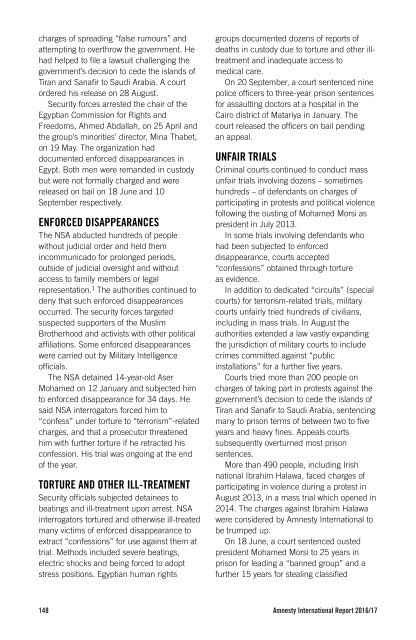AMNESTY INTERNATIONAL REPORT 2016/17
2lEHU9j
2lEHU9j
Create successful ePaper yourself
Turn your PDF publications into a flip-book with our unique Google optimized e-Paper software.
charges of spreading “false rumours” and<br />
attempting to overthrow the government. He<br />
had helped to file a lawsuit challenging the<br />
government’s decision to cede the islands of<br />
Tiran and Sanafir to Saudi Arabia. A court<br />
ordered his release on 28 August.<br />
Security forces arrested the chair of the<br />
Egyptian Commission for Rights and<br />
Freedoms, Ahmed Abdallah, on 25 April and<br />
the group’s minorities’ director, Mina Thabet,<br />
on 19 May. The organization had<br />
documented enforced disappearances in<br />
Egypt. Both men were remanded in custody<br />
but were not formally charged and were<br />
released on bail on 18 June and 10<br />
September respectively.<br />
ENFORCED DISAPPEARANCES<br />
The NSA abducted hundreds of people<br />
without judicial order and held them<br />
incommunicado for prolonged periods,<br />
outside of judicial oversight and without<br />
access to family members or legal<br />
representation. 1 The authorities continued to<br />
deny that such enforced disappearances<br />
occurred. The security forces targeted<br />
suspected supporters of the Muslim<br />
Brotherhood and activists with other political<br />
affiliations. Some enforced disappearances<br />
were carried out by Military Intelligence<br />
officials.<br />
The NSA detained 14-year-old Aser<br />
Mohamed on 12 January and subjected him<br />
to enforced disappearance for 34 days. He<br />
said NSA interrogators forced him to<br />
“confess” under torture to “terrorism”-related<br />
charges, and that a prosecutor threatened<br />
him with further torture if he retracted his<br />
confession. His trial was ongoing at the end<br />
of the year.<br />
TORTURE AND OTHER ILL-TREATMENT<br />
Security officials subjected detainees to<br />
beatings and ill-treatment upon arrest. NSA<br />
interrogators tortured and otherwise ill-treated<br />
many victims of enforced disappearance to<br />
extract “confessions” for use against them at<br />
trial. Methods included severe beatings,<br />
electric shocks and being forced to adopt<br />
stress positions. Egyptian human rights<br />
groups documented dozens of reports of<br />
deaths in custody due to torture and other illtreatment<br />
and inadequate access to<br />
medical care.<br />
On 20 September, a court sentenced nine<br />
police officers to three-year prison sentences<br />
for assaulting doctors at a hospital in the<br />
Cairo district of Matariya in January. The<br />
court released the officers on bail pending<br />
an appeal.<br />
UNFAIR TRIALS<br />
Criminal courts continued to conduct mass<br />
unfair trials involving dozens – sometimes<br />
hundreds – of defendants on charges of<br />
participating in protests and political violence<br />
following the ousting of Mohamed Morsi as<br />
president in July 2013.<br />
In some trials involving defendants who<br />
had been subjected to enforced<br />
disappearance, courts accepted<br />
“confessions” obtained through torture<br />
as evidence.<br />
In addition to dedicated “circuits” (special<br />
courts) for terrorism-related trials, military<br />
courts unfairly tried hundreds of civilians,<br />
including in mass trials. In August the<br />
authorities extended a law vastly expanding<br />
the jurisdiction of military courts to include<br />
crimes committed against “public<br />
installations” for a further five years.<br />
Courts tried more than 200 people on<br />
charges of taking part in protests against the<br />
government’s decision to cede the islands of<br />
Tiran and Sanafir to Saudi Arabia, sentencing<br />
many to prison terms of between two to five<br />
years and heavy fines. Appeals courts<br />
subsequently overturned most prison<br />
sentences.<br />
More than 490 people, including Irish<br />
national Ibrahim Halawa, faced charges of<br />
participating in violence during a protest in<br />
August 2013, in a mass trial which opened in<br />
2014. The charges against Ibrahim Halawa<br />
were considered by Amnesty International to<br />
be trumped up.<br />
On 18 June, a court sentenced ousted<br />
president Mohamed Morsi to 25 years in<br />
prison for leading a “banned group” and a<br />
further 15 years for stealing classified<br />
148 Amnesty International Report <strong>2016</strong>/<strong>17</strong>


